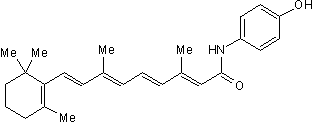Fenretinide
Chemical Name: N-(4-Hydroxyphenyl)retinamide
Purity: ≥98%
Biological Activity
Fenretinide is a synthetic retinoid agonist. Antiproliferative, antioxidant and anticancer agent with a long half-life in vivo. Apoptotic effects appear to be mediated by a mechanism distinct from that of 'classical' retinoids.Technical Data
The technical data provided above is for guidance only.
For batch specific data refer to the Certificate of Analysis.
Tocris products are intended for laboratory research use only, unless stated otherwise.
Additional Information
Background References
-
Pharmacokinetics of all-trans retinoic acid, 13-cis retinoic acid, and fenretinide in plasma and brain of rat.
Le Doze et al.
Drug Metab.Dispos., 2000;28:205 -
Antioxidant properties of N-(4-hydroxyphenyl)retinamide (fenretinide).
Takahashi
Biol.Pharm.Bull., 2000;23:222 -
Fenretinide and its relation to cancer.
Ulukaya and Wood
Cancer Treat.Rev., 1999;25:229
Product Datasheets
Reconstitution Calculator
Molarity Calculator
Citations for Fenretinide
The citations listed below are publications that use Tocris products. Selected citations for Fenretinide include:
6 Citations: Showing 1 - 6
-
Sphingolipid Modulation Activates Proteostasis Programs to Govern Human Hematopoietic Stem Cell Self-Renewal.
Authors: Xie Et al.
Cell Stem Cell 2019;25:639
-
Retinoic acid worsens ATG10-dependent autophagy impairment in TBK1-mutant hiPSC-derived motoneurons through SQSTM1/p62 accumulation.
Authors: Catanese Et al.
Autophagy 2019;15:1719
-
Evidence that TLR4 Is Not a Receptor for Saturated Fatty Acids but Mediates Lipid-Induced Inflammation by Reprogramming Macrophage Metabolism.
Authors: Lancaster Et al.
Cell Metab 2018;27:1096
-
Lipophagy prevents activity-dependent neurodegeneration due to dihydroceramide accumulation in vivo.
Authors: Jung Et al.
EMBO Rep 2017;18:1150
-
Impaired aldehyde dehydrogenase 1 subfamily member 2A-dependent retinoic acid signaling is related with a mesenchymal-like phenotype and an unfavorable prognosis of head and neck squamous cell carcinoma.
Authors: Seidensaal Et al.
Am J Pathol 2015;14:204
-
Retinoic acid receptor alpha is associated with tamox. resistance in breast cancer.
Authors: Johansson Et al.
Nat Commun 2013;4:2175
FAQs
No product specific FAQs exist for this product, however you may
View all Small Molecule FAQsReviews for Fenretinide
There are currently no reviews for this product. Be the first to review Fenretinide and earn rewards!
Have you used Fenretinide?
Submit a review and receive an Amazon gift card.
$25/€18/£15/$25CAN/¥75 Yuan/¥2500 Yen for a review with an image
$10/€7/£6/$10 CAD/¥70 Yuan/¥1110 Yen for a review without an image

